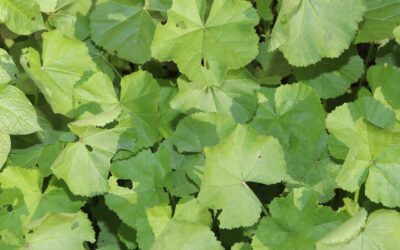Mallow weed is a common problem for commercial facility and property managers, quickly taking over landscapes if not properly controlled. These pesky weeds can be identified by their round, fuzzy leaves and small pink or white flowers. In this ultimate guide, we'll...
Recent Posts
The Landscaper’s Guide To Plant Growth Regulators
Landscapers often struggle with controlling plant sizes and health. Plant Growth Regulators (PGRs) are organic compounds that modify plant growth. This article will guide you in using PGRs to solve common landscaping challenges. Read on for a landscaper's guide to...
How Lawn Pest Control Enhances Overall Landscape Health
According to recent research by the University of Princeton, lawns account for over 40 million acres of American land today. Maintaining a lush, green space is more than just a matter of aesthetics; it's about creating a healthy, sustainable outdoor environment. One...
Commercial property problems will always pop up, regardless of how well you fix them. Something like a leak should never go unchecked, as that can result in extensive damage to both a building’s structure as well as its electrical components.
However, not every landlord knows exactly what parts of their property need maintenance. In particular, ignoring commercial property maintenance could result in your tenant’s business suffering. This makes you vulnerable to a lawsuit and a loss of income.
Here’s your guide on how to care for your property as a commercial property owner.
Understanding Responsibilities
First, you should understand your responsibilities as a landlord and what you can leave to your tenant.
For example, the daily maintenance of a property almost never falls upon the landlord. The tenant is the one who needs to clean the floors, manage minor plumbing issues, and keep their pets in line.
What falls upon the landlord are things such as electrical work, public area landscaping, and HVAC repair. These are things that often cost a lot more to manage. You may also have a preferred service provider that you’d rather use than whoever your tenant might hire.
It’s then up to the landlord whether or not they want to do repairs and maintenance themselves or to hire a service provider. These often provide services such as cleaning, pressure washing, and general repairs.
In some rare cases, you may be able to have the tenant agree to handle any maintenance and repairs on their own.
A “Duty to Repair” clause in your agreement allows tenants to perform repairs themselves in exchange for reimbursement or a temporary rent reduction.
Landscaping
One of the first areas you may want to care for on your commercial property is the landscaping. While this isn’t essential for your building’s functionality, it is something that many tenants may overlook or ignore completely.
Some of the most basic landscaping duties include mowing the lawn, killing weeds, and keeping your sprinkler system working. If you let your tenants hire a landscaper, they may not find one that lives up to your expectations.
You may also need a tree surgeon on call for things like pest invasions or overgrowth roots.
The main problem with a pest invasion is that it can easily spread to your other trees. Not only will they begin to die on you, but they could also prove a risk to the rest of your property. This is especially true if you have much larger trees to care for that could come crashing down during a heavy storm.
Overgrown roots are a hidden threat to your overall property. First, they can limit what kind of other plants you can grow since they suck up all the nutrients in your yard. Second, these roots can cause damage to your plumbing systems like your pipes and septic lines.
Fertilization and Pest Control
Managing both your property’s fertilization and pest control is another key part of maintaining its appearance.
Not every yard uses native foliage or plant life as decoration. In many cases, you’ll need special fertilizer and soil to grow something that normally belongs in another climate. Even native plants sometimes need help when grown in proximity to other vegetation.
On top of that, you need to take care of any pests that may upset your plants as well as your tenants.
Some of the most common Florida household pests include ants, termites, roaches, and spiders. As a property owner, you may want to opt for some kind of natural pesticide so that you don’t coat your lawn with toxic chemicals.
Specialized Horticulture
Some parts of your landscaping will require a specialized kind of care past pesticides and tree trimming. You may want to hire a landscaping service that can handle things like ornamental gardening, organic gardening, and even restorative landscaping.
Ornamental gardening refers to arranging your flowers, shrubs, and trees in a visually pleasing arrangement. If you prefer to use non-toxic yard treatments, you’ll want to hire a service provider that won’t use synthetic fertilizers or pesticides.
Finally, a yard that has gone through a lot of wear and tear may need restorative landscaping. This involves rehabilitating degraded landscapes that have been affected by erosion, pollution, or mismanagement.
Cleaning
In most cases, tenants are responsible for cleaning the areas they frequently use. However, this doesn’t always apply to public areas such as stairwells between floors or sidewalks.
Arrange for janitorial services to keep the interior of your building clean. Pressure washing and window washing will also come in handy for keeping the exterior looking new.
If there’s a lot of garbage on the lawn, the landlord should hire a company to clean it up.
Water and Irrigation Systems
A commercial property owner needs to monitor the plumbing on their properties and fix any problems as soon as possible. If a tenant calls about a burst pipe, you need to be able to walk them through shutting off the water and then call up your plumber.
If your property has a well water system, then it’s your job to keep it clean and change the filters. The same goes for any damaged sprinkler and irrigation systems.
Commercial Property Maintenance Cost Factors
A good rule of thumb is to set aside half of your income just in case you need it for property expenses. That way, you have plenty of money available just in case major repairs are needed or you’re forced to evict a tenant.
Another tip is to save up around 1% of the price of your property for maintenance. You could also put aside an amount of money equal to 1.5 times the monthly rent.
Caring for Your Property
Commercial property maintenance is one of the most important duties for a landlord. It’s essential that you keep your investment in good condition not only for your own sake but for your tenants. This will help you avoid major repairs later on as well as a lawsuit.
When it comes to your landscaping needs, Sunrise Landscape is here to help. We offer full-service Tampa-based commercial landscaping with more than 40 years of experience. Contact us today to set up a visit and to learn more.
Contact Us
"*" indicates required fields
Recent Posts
Mallow Weed Control: The Ultimate Guide
Mallow weed is a common problem for commercial facility and property managers, quickly taking over landscapes if not properly controlled. These pesky weeds can be identified by their round, fuzzy leaves and small pink or white flowers. In this ultimate guide, we'll...
The Landscaper’s Guide To Plant Growth Regulators
Landscapers often struggle with controlling plant sizes and health. Plant Growth Regulators (PGRs) are organic compounds that modify plant growth. This article will guide you in using PGRs to solve common landscaping challenges. Read on for a landscaper's guide to...



